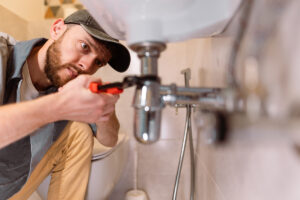
Winterizing your plumbing requires a little bit of effort, but it’s worth the peace of mind.
As the temperature begins to drop and the cold months approach, it’s essential to take proactive steps to protect your home’s plumbing system. Failing to prepare for freezing temperatures can lead to burst pipes, water damage, and costly repairs. Fortunately, winterizing your plumbing is a relatively simple task that can save you time, money, and frustration when the winter chill sets in. Whether you’re a new homeowner or a seasoned one, here’s a comprehensive guide to ensure your plumbing is well-prepared for the winter.
Why Winterizing Your Plumbing Is Important
Water expands when it freezes, and this expansion can cause significant pressure inside your pipes. When this happens, the pipes may crack or burst, leading to severe water damage. Even a small crack can release hundreds of gallons of water in just a day. The resulting damage can ruin flooring, walls, and valuable belongings. Taking steps to winterize your plumbing helps avoid these risks and keeps your water flowing smoothly throughout the colder months.
Key Steps to Winterizing Your Plumbing
- Insulate Your Pipes: The most vulnerable pipes are those located in unheated areas, such as basements, attics, and crawl spaces. To prevent freezing, wrap exposed pipes with pipe insulation or heat tape. This helps maintain a safe temperature and prevents water inside the pipes from freezing. Pay close attention to pipes near exterior walls, as they’re particularly susceptible to freezing temperatures.
- Seal Cracks and Openings: Inspect your home for any cracks or openings in walls, floors, and around windows or doors where cold air might enter. Use caulk or insulation foam to seal these gaps and keep the cold out. Sealing these cracks can help maintain a warmer environment inside and protect any plumbing located near exterior walls.
- Disconnect and Drain Outdoor Hoses: Outdoor faucets and hoses are often overlooked but are among the most common causes of frozen pipes. Disconnect all hoses from outdoor faucets and store them indoors. Make sure to drain the hoses completely to prevent water from freezing inside them. Additionally, shut off the water supply to outdoor faucets and drain any remaining water from the lines.
- Shut Off and Drain Sprinkler Systems: If you have an irrigation system, it’s important to winterize it as well. Shut off the water supply to the sprinkler system and use an air compressor to blow out any remaining water in the pipes. This will prevent the system from freezing and getting damaged during winter.
- Keep a Slow Drip: During especially cold nights, consider leaving a slow trickle of water running from faucets connected to exposed pipes. The movement of water through the pipes helps prevent freezing. Even a small drip can keep your pipes from freezing and cracking during an unexpected cold snap.
- Maintain a Consistent Temperature: Keeping your thermostat at a consistent temperature—day and night—helps prevent freezing. Even when you’re away from home, set the thermostat to at least 55°F (12°C) to ensure that your home stays warm enough to protect the plumbing.
- Locate Your Main Water Shutoff Valve: In case a pipe does freeze and burst, you’ll need to know how to quickly shut off the water supply. Familiarize yourself with the location of your main water shutoff valve so you can act fast if necessary. Shutting off the water promptly can minimize the extent of water damage.
- Winterize Vacant Homes: If you’re leaving a home vacant for the winter, it’s crucial to winterize the plumbing completely. Shut off the water supply and drain all water from the pipes by opening faucets and flushing toilets until the pipes are empty. This reduces the risk of any water freezing and causing damage while the home is unoccupied.
What to Do If Your Pipes Freeze
Despite your best efforts, there’s always a chance that a pipe may freeze during an extremely cold winter. If you notice a frozen pipe, take immediate action to prevent it from bursting. Apply heat to the frozen section of the pipe using a hairdryer, heating pad, or hot towels. Never use an open flame or a blowtorch, as this can damage the pipe and create a fire hazard.
Once the pipe has thawed, check for any cracks or leaks. If you notice any damage, it’s best to call a plumber to assess and repair the issue before it gets worse.
Call Mahon Plumbing Today
If you still have more questions regarding your plumbing, we here at Mahon Plumbing are here to help. We have been serving the wider Baltimore area since 1994, so we have 25 years of experience to back up our fantastic service! Call us at our Baltimore location at 410-766-8566 or our Pasadena location at 410-636-7944. Be sure to keep up with us on social media by following us on Facebook or Twitter.
